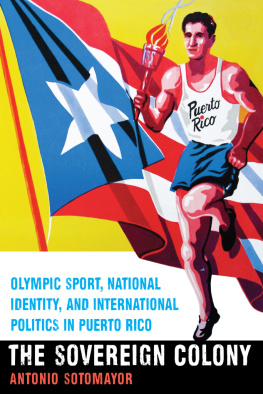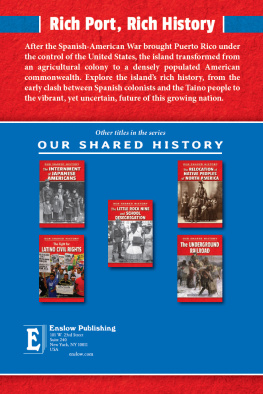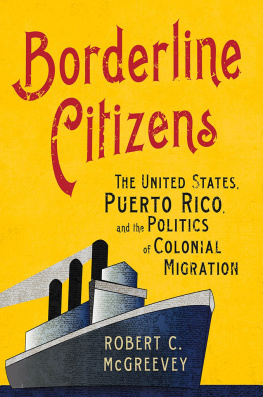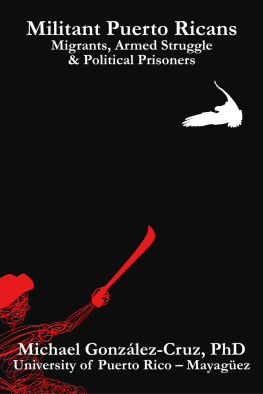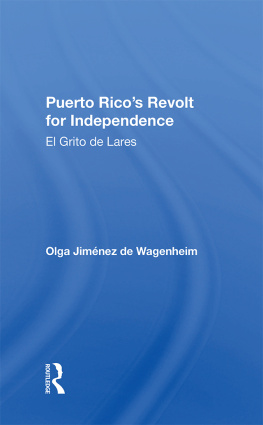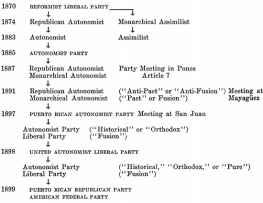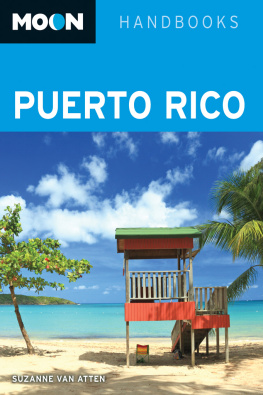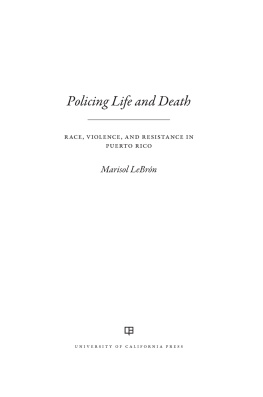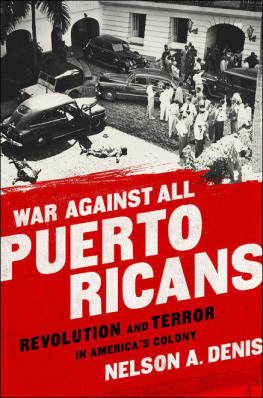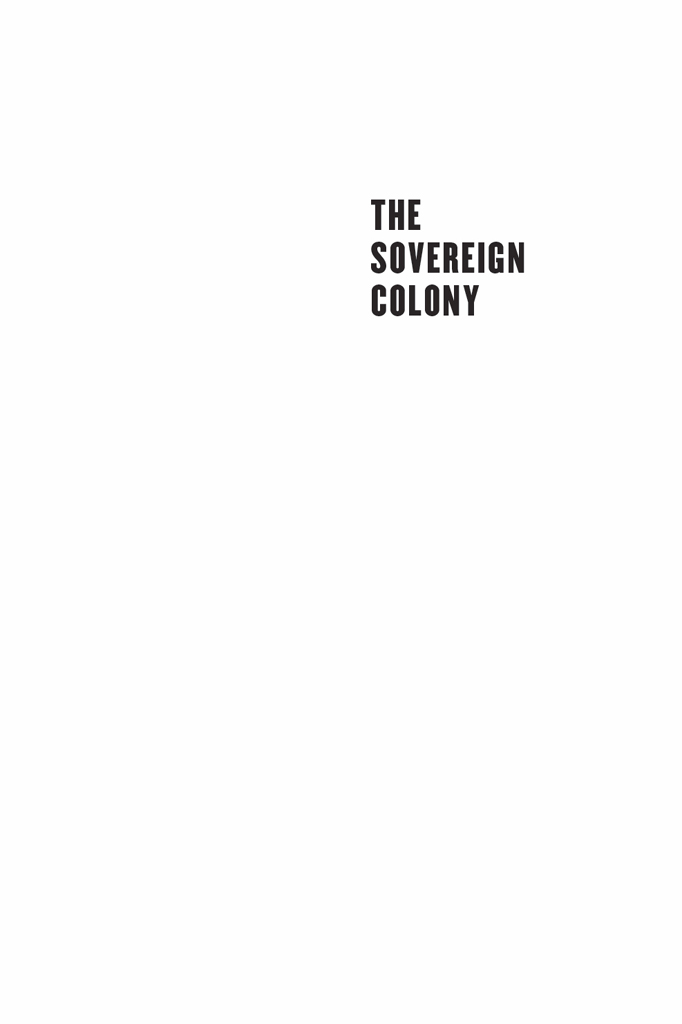

2016 by the Board of Regents of the University of Nebraska. An earlier version of chapter 5 was previously published as The Cold War Games of a Colonial Latin American Nation: San Juan, Puerto Rico, 1966, in Diplomatic Games: Sport, Statecraft, and International Relations since 1945 , ed. Heather L. Dichter and Andrew Johns (Lexington: University Press of Kentucky, 2014), 21749. All rights reserved.
Library of Congress Cataloging-in-Publication Data
Names: Sotomayor, Antonio, author.
Title: The sovereign colony: Olympic sport, national identity, and international politics in Puerto Rico / Antonio Sotomayor.
Description: Lincoln: University of Nebraska Press, 2016. |
Includes bibliographical references and index.
Identifiers: lccn 2015021065
ISBN 9780803278813 (hardback: alk. paper)
ISBN 9781496206381 (paper: alk. paper)
ISBN 978-0-8032-8538-5 (epub)
ISBN 978-0-8032-8539-2 (mobi)
ISBN 9780803285408 (pdf)
Subjects: lcsh: OlympicsParticipation, Puerto Rican. |
OlympicsPolitical aspectsPuerto Rico. | Nationalism and sportsPuerto Rico. | bisac: history / Latin America / General. | political science / Political Ideologies / Nationalism. | sports & recreation / Olympics.
Classification: lcc gv721.4.p9 s68 2016 | ddc 796.48dc23 LC record available at http://lccn.loc.gov/2015021065
Set in Minion Pro by M. Scheer.
The publisher does not have any control over and does not assume any responsibility for author or third-party websites or their content.
Para mi padre, Antonio Sotomayor Mora, y madre, Sandra Carlo Santana.
To Nicole, who proves that dreams can come true.
Para Paio y Amalia, son la luz en mi vida.
Illustrations
FIGURES
MAPS
TABLES
Acknowledgments
This book is the result of a dream, a dream that often looked as elusive as the mere writing of these few words of acknowledgment. This dream was never clear and set, but went through different versions as I traveled the winding roads of scholarly training. Most important, it was a dream fostered and nurtured by the support I have received directly or indirectly from family, friends, and colleagues throughout the years. A few sincere words of appreciation are in order for so many people, most of whom, for lack of space, will have to stay in a collective heartfelt gracias! From my cherished and never forgotten twelve years of schooling at Colegio Espritu Santo in Hato Rey, Puerto Rico, to my life-changing and character-building years at Universidad de Puerto RicoRecinto de Mayagez (Colegio!), this book owes a little bit to all of you. Contrary to the stereotype for a Latin American, I play basketball, not soccer, and not baseball (although I did play little league baseball). Hence my early passion for sports derives from this sport and the friends I played with back in the Joyuda beachfront Liga de Punta Arenas in Cabo Rojo and during four years of high school varsity and street games. I was never any good, but I did love the game. I still remember watching, celebrating, and mourning the 1990 World Championship of Basketball, where the Puerto Rican team, after beating the great and eventual champion Yugoslavian team, finished in fourth place after losing the bronze medal game in overtime by two points against the United States. Although Puerto Rico had beaten the United States earlier in the tournament, it was Puerto Ricos highest finish in fibas championship. I believe this 1990 team, which included Federico Fico Lpez, Georgie Torres, Mario Quijote Morales, Jos Piculn Ortiz, Ramn Rivas, and Jerome Mincy, among others, was Puerto Ricos best national squad. Thank you, guys, for so many thrills!
There is a select group of people, in Puerto Rico and the States, who throughout the first few years of graduate school were a central source of support; they know who they are, and to them I give my deep gratitude. I found much inspiration, encouragement, and support from faculty and friends during my graduate work at Indiana UniversityBloomington and at the University of Illinois at Urbana-Champaign. My introduction into the scholarly study of history was with Arlene Daz. During my stay at iu she published her book on the history of Venezuelan law and women (coincidentally also with University of Nebraska Press) and gave me a dedicated copy, which motivated me throughout graduate school. As promised, and eleven years later, heres my book! As a masters student at Illinois, I was equally lucky in having a great history mentor and friend, Nils Jacobsen. My initial sustained training as a historian occurred under his guidance, and for that I remain eternally thankful. Also at Illinois I found much encouragement and advice from Arlene Torres, a great scholar of Puerto Rico and mentor to many. Thank you. Other scholars and friends were influential in my initial training at Illinois, for which I am equally grateful; they include Maria Todorova, Carol Symes, Alejandro Lugo, Ellen Moodie, Dara Gold-man, and my clacs cohort, Amy Firestone, Courtney Fuoss, and Cuauhtemoc Mexica.
The details of this project began to take clear shape during my PhD work at the University of Chicago. There I found many supportive colleagues that made my stay an enriching experience, both academically and personally. For this I thank Jos ngel Hernndez, Pablo Ben, Patrick Iber, Jaime Pensado, Nicole Mottier, Sarah Osten, Heather Allen, Mikael Wolfe, Sara Hirschhorn, Darryl Heller, George Ironstrack, Samuel Lebovic, Toussaint Losier, Alejandro Maya, Theodore Francis II, Richard del Rio, Johnhenry Hank Gonzalez, Emily Remus, Zachary Chase, Jeevan Devassy, Mara Balandrn-Castillo, Jackie Summer, Casey Lurtz, Diana Schwartz, Janette Gayle, Tessa Murphy, and Laurencio Sanguino. Particular thanks to my cohort in Latin American and Caribbean history; without them the program would have been a very lonely road: Sabine Cadeau, Matthew Barton, Stuart Easterling, Amanda Hartzmark, Ananya Chakravarti, and Romina Robles Ruvalcaba.
Concrete ideas for this book began to take shape at Chicago with the encouragement, guidance, and supervision of a great team of scholars and mentors, including Dain Borges, Emilio Kour, and Agnes Lugo-Ortiz. I am deeply grateful for their excellent advising, critical evaluation, and thoughtful suggestions. I also benefited from the mentoring and supervision of different scholars at Chicago, including Julie Saville, Stephan Palmi, Mauricio Tenorio, and John MacAloon. Early versions of this book received great feedback and suggestions by colleagues at the Latin American History Workshop and the Caribbean Studies Workshop, both at the University of Chicago, and at the Conference on Latin American History, the International Congress of the Latin American Studies Association, and the Puerto Rican Studies Association Conference.
Throughout the long process of thinking, writing, and presenting different parts of this book I have received valuable feedback, motivation, and support of colleagues who deserve my sincere appreciation and respect: Francisco Scarano, William Beezley, Lillian Guerra, Margaret Power, Brenda Elsey, Joel Horowitz, and Mara Alejandra Prez. Special words of gratitude to the late Joseph Arbena, a pioneer of Latin American sports history and a source of encouragement and good humor. Hell be missed. April Yoder read and provided poignant and motivating feedback to a longer version of this project, for which I am profoundly grateful. I also received much appreciated words of encouragement and feedback from colleagues at Historicizing the Pan-American Games: An International Colloquium at the University of TorontoScarborough, including the organizers Bruce Kidd and Csar Torres, and Thomas Carter, David Sheinin, Russell Field, Sarah Teetzel, Francesco Ragno, Mariadele di Blasio, Mark Dyerson, John MacAloon, and many more from the engaging audience.
Next page
